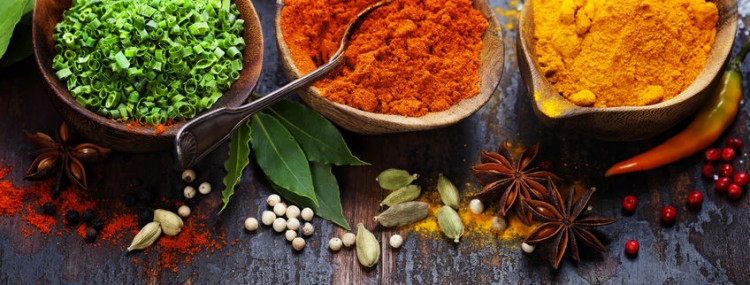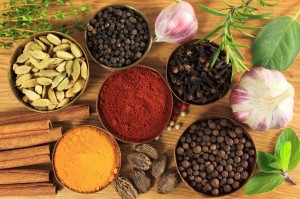
The Indian Spice Route To Health
 For centuries, Indians have used many spices in cooking. Spices and herbs have found their way into the Vedas. Indian traditional spices have been known for their health benefits, and were used in traditional systems of medicine to cure many diseases.
For centuries, Indians have used many spices in cooking. Spices and herbs have found their way into the Vedas. Indian traditional spices have been known for their health benefits, and were used in traditional systems of medicine to cure many diseases.
Black pepper has been mentioned in the Yajur Veda, while mustard finds a mention in the Rig Veda. Spices are part of Ayurveda system of medicine, and it is postulated that turmeric (haldi) was given religious significance to make sure it would be used everyday, to obtain its significant health benefits!
Researchers have been exploring the possible health benefits of Indian spices, and trying to isolate the bioactive substances present in them. So far while some evidence for health benefits have been found, others need more study.
Here we look at some spices, the health benefits ascribed to them and what scientific evidence so far says about the ascribed benefits.
1. Black cumin or kalajeera : Digestive and antacid properties are ascribed to cumin seeds. Research shows that the seeds have bioactive substances namely , saponins, thymoquinones, and alkaloids, which have the potential to induce cell death in breast cancer cell lines, and to regulate blood glucose levels, and inhibit cholesterol absorption.
2. Black pepper or kali mirch – Black pepper is used to treat cold, cough and upper respiratory infections. No available evidence has been found on either benefits or side effects in studies so far.
3. Cardamom or elaichi: The health benefits ascribed include aiding in digestion, relieving flatulence and stomach cramps. Active ingredients in cardamom include phytochemical – limonene and 1, 8 – cineole, which have anti oxidant properties, and anti spasmodic properties, which could help in pain relief. There are no side effects of cardamom with the amounts used in cooking.
4. Turmeric or haldi : Haldi is believed to have anti inflammatory, anti-septic and purifying effects. Clinical trials using large doses show no toxicity of curcumin, the active ingredient in haldi. Small clinical trials show anti cancer effects.
5. Onion and garlic: The outer layers of onion contain quercetin, a flavanoid with antioxidant properties. Meta analysis of 11 randomized control trials indicated hypotensive effects, increased antioxidant status, however more consistency needed. Garlic has some anti inflammatory properties, and hypotensive effects (lowering of blood pressure). More research is needed to confirm these.
6. Oregano or ajwain : Research has shown that ajwain seeds have antioxidant effects and are beneficial in preventing atherogenesis and certain types of cancer. Ajwain helps in digestion,has anti inflammatory and anti bacterial properties.
7. Nutmeg or jaiphal: It is believed to have physchological effects . In large doses nutmeg can be poisonous and can even be fatal ! Very small quantities should be used in cooking.
Give yourself the gift of Indian spices and their health, with fresh food planned down to the last calorie by professional nutritionists and chefs, at Calorie Care. Visit caloriecare.com to order your healthy Indian plate today !



